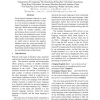Free Online Productivity Tools
i2Speak
i2Symbol
i2OCR
iTex2Img
iWeb2Print
iWeb2Shot
i2Type
iPdf2Split
iPdf2Merge
i2Bopomofo
i2Arabic
i2Style
i2Image
i2PDF
iLatex2Rtf
Sci2ools
ACL
2015
2015
Learning to Adapt Credible Knowledge in Cross-lingual Sentiment Analysis
Cross-lingual sentiment analysis is a task of identifying sentiment polarities of texts in a low-resource language by using sentiment knowledge in a resource-abundant language. While most existing approaches are driven by transfer learning, their performance does not reach to a promising level due to the transferred errors. In this paper, we propose to integrate into knowledge transfer a knowledge validation model, which aims to prevent the negative influence from the wrong knowledge by distinguishing highly credible knowledge. Experiment results demonstrate the necessity and effectiveness of the model.
| Added | 13 Apr 2016 |
| Updated | 13 Apr 2016 |
| Type | Journal |
| Year | 2015 |
| Where | ACL |
| Authors | Qiang Chen, Wenjie Li, Yu Lei, Xule Liu, Yanxiang He |
Comments (0)

